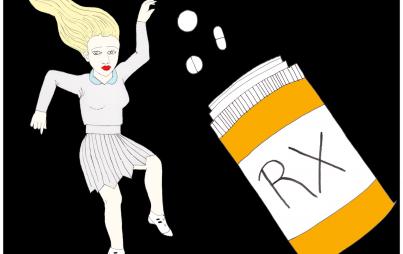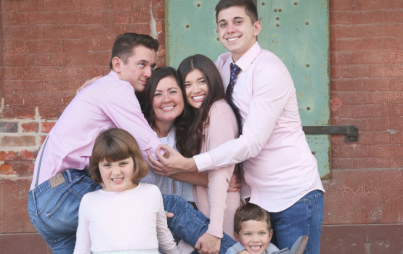
You can stay sober without AA — at least, I've been able to.
I stopped attending meetings because a lot of stuff I was instructed to believe became less useful the more “sober” I got.
There are a couple different ways to make an oyster shooter. Most of them involve an oyster swimming in its own juice or tomato juice, though sometimes it’s cocktail sauce. Usually there’s a lemon wedge and some hint of Tabasco — and yes, there’s usually at least a little booze.
Of course, I knew this when I was handed the shot. It was New Year’s Eve — my birthday— and my partner and I were in Sri Lanka at a dinner party hosted by his brother.
What was I thinking? Well, I was thinking that the host knew I didn’t drink, as beforehand, he’d asked me if I ate food prepared with alcohol and I told him yes. So I didn’t hesitate.
The shot went down — hot. Not hot as in Tabasco, but hot as in alcohol.
It had been pure booze.
Hi, my name is Melissa, and I’m an alcoholic.
At least, this is how I introduced myself for years. When I got sober in 2007, I was pretty convinced of this fact.
By my mid-20s, years of regrettable weekend-drinking had metamorphosed into drinking nearly every day, usually with strangers who did or did not pay me for sex. Mine was a not-pretty story I’ve since told many times in meetings and in print, having authored at this point probably literally hundreds of articles on the subject of addiction and recovery, mostly from what I’d call a “12-step perspective.”
Without a doubt, going to Alcoholics Anonymous meetings and being a part of the fellowship saved my life.
But after six years of devoted participation, my attendance dwindled; until about a year ago, when I stopped going entirely. Contrary to what I was taught when I was in the program (or what happened this past New Year’s — more on that in second!) my sobriety’s just fine. You can stay sober without AA — at least, I've been able to.
Your mileage may vary, of course, but here’s how I do it:
1. I remember what AA taught me.
If you think you have a drinking problem, you should check out AA. That’s my advice, period.
From my very first meeting, I learned a lot about addiction and how my addictive nature manifests. I worked with a sponsor and did the Steps, which gave me tons of invaluable insight into myself and my experience. I learned the value of service. I learned heaps of strategies that help me not drink.
I stopped attending meetings because a lot of stuff I was instructed to believe became less useful the more “sober” I got. The other day I came across this great article that spells out the very frustration I would feel in meetings.
The more recovered I got, the less sense it made to attribute aspects of my character simply to alcoholism.
Ironically, thanks in great part to the work I did in 12-step programs, I learned that alcoholism wasn’t my only problem — or even my biggest problem.
I stopped attending AA meetings because they stopped feeling useful to me. And because I question and outright disagree with a lot of key components to the program, I no longer felt I was the right person to “carry the message.”
All that said, I’ll never forget all the valuable things I know thanks to AA.
2. I remind myself that there are lots of good reasons not to drink.
Of all the things I learned from AA, one thing I know for sure is that drinking and me don’t mix. Eight years later, this is something I don’t question.
Is my reaction to alcohol because I have an allergy to alcohol that sets off a physical craving for which there is no cure? I’m not sure.
On New Year’s Eve, after I took that shot, I felt, well — shot. For the next three courses, I felt it burn its way through me. I had that warm, flushed, and generally toxic feeling I remembered acutely from when I drank. Then came the headache. I felt dozy, like I needed a nap.
Granted, it was our first night in the country, and I was probably experiencing jet lag in addition to the effects of the booze. But, like I said, the feeling was familiar. It was the exact kind of feeling that, prior to sobriety, I’d have drunk more to get rid of... until I was completely smashed.
Instead, that night, I suffered through it until I felt completely sober again. At no point did I feel a craving to drink more.
Does this mean I’m not an alcoholic? To me, it doesn’t matter.
The yucky way alcohol makes me feel is reason enough not to drink. I avoid refined sugar and processed foods because of how crummy my body feels after eating them — why should alcohol be any different?In addition, I practice secular Buddhism, which encourages its practitioners to abstain from alcohol.
There are literally hundreds of good reasons not to drink (see here, here, and here). Everything from never having to worry about hangovers to the money I save keeps me from returning to the habit.
3. I pay attention to close calls.
The oyster shot had been an accident. I didn’t drink the rest of the night — nor did I even want to. In fact, when I heard that the palate cleanser between dinner and dessert was topped with some kind of boozy foam, I passed.
Still, it’s decidedly weird to have taken a shot when you’re over eight years sober, especially after having been indoctrinated by AA.
Having attended meetings for years, I’ve heard plenty of stories from people with long-term sobriety who’d somehow started drinking again and stopped attending meeting until their drinking became unmanageable yet again.
I definitely don’t want to be one of those people. I don’t want to drink, and so I take red flags and close calls seriously.
Red flags, to me, are thoughts that romanticize drinking. Sometimes, for example, I’ll find myself liking the way alcohol smells or tastes on my partner’s mouth. Or I’ll feel left out when I’m at a dinner party and everyone else is drinking. I’ll sometimes find myself wishing I had a wine glass, too.
When I have thoughts like this, I share them.
I took what happened New Year’s Eve very seriously. That night, I checked in with my partner.
Had I not been halfway around the world, in a different time zone and with spotty internet access, I definitely would have checked in with program friends. Hell, you might say I’m checking in right now.
4. I don’t revoke my AA membership.
I don’t want to be one of those people who march back into AA after one day sober, tail between their legs.
But I would rather this happen than return to the life I was living prior to sobriety. Before I got sober, my physical and mental health were questionable. My career had hit a dead-end. All I wanted to do was be wasted, and I was putting myself in dangerous situations when I drank.
Most of all, I was isolated and lonely, my drinking and poor choices having alienated me from everyone around me.
One of the best parts of the 12-step program was that I felt welcomed into a community of people like me. I met people who knew the devastation of hardcore drinking, as well as the joys of living alcohol-free. I may not go to meetings anymore, but I still keep in touch with these kinds of people.
Today, my life is full of people whose lives don’t revolve around consuming booze.
Of all the things that support my sobriety, one of the most critical is knowing that there are sober people are all around me, inside and outside formal programs like AA.








